Covid-19: Is the pandemic a showstopper for am-dram?
- Published
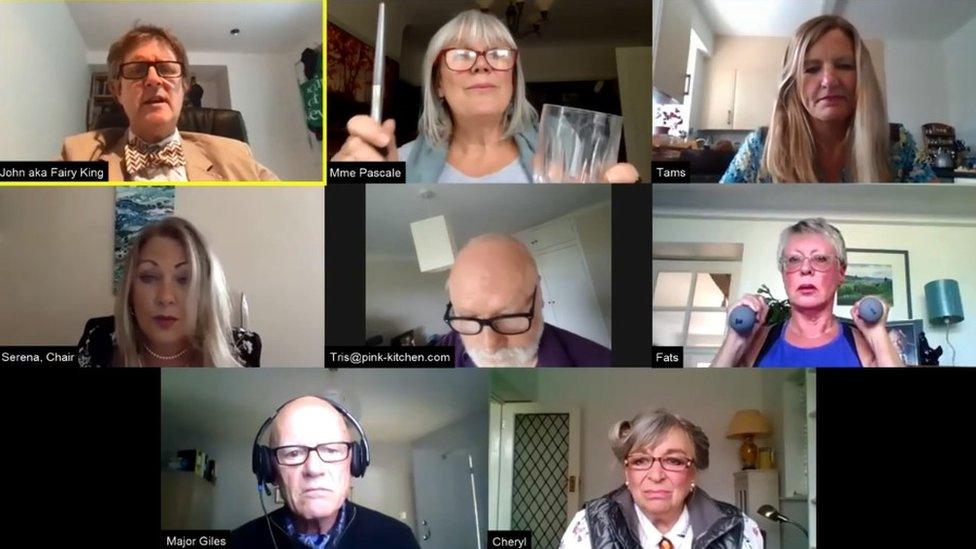
Zoom, A Play for Lockdown - is this the future of am-dram?
From musicals to whodunnits, pantomimes to farces, amateur drama companies have long been a source of entertainment in their communities. In 2020, though, staging plays in small theatres and village halls under social-distancing rules is far from straightforward.
The latest government regulations state that amateur arts activities can only take place if there is no mingling between groups of six, and the guidance for working in the arts sector, external is followed.
There are warnings that with many am-dram groups inactive, audiences' and members' interest could decline and important seedbeds for stage talent could fade away.
So what steps are being taken to try to keep amateur dramatics alive?
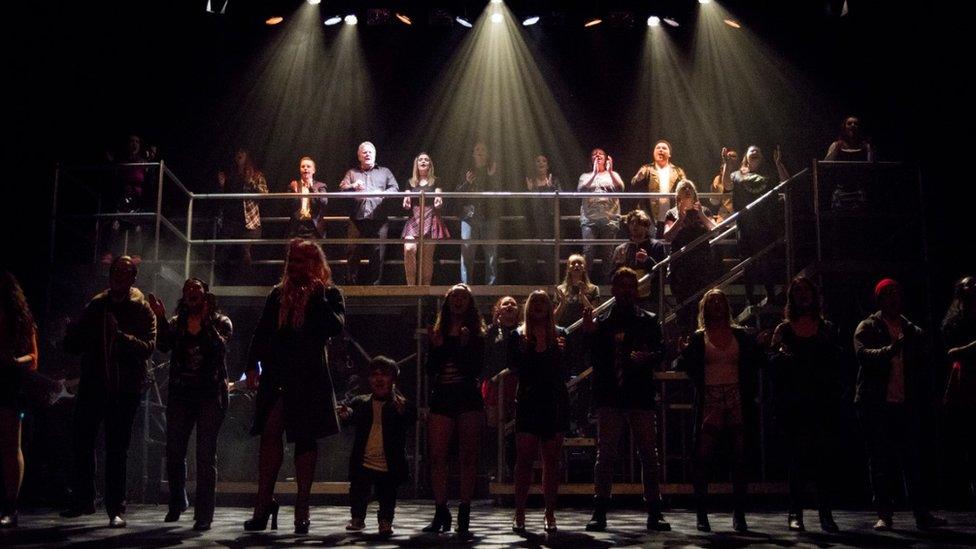
Southend Operatic and Dramatic Society's last performances were in 2019
"It's a real worry how we will survive financially," said Lewis Carlisle, chairman of Southend Operatic and Dramatic Society.
The 70-strong company was due to be celebrating its 130th anniversary this year but had to cancel its production of the musical Company and is struggling to rehearse for Anything Goes next year.
"It's not just the ticket revenues we're losing - we can't do any publicity, it's hard to charge members, we've no social events or fundraisers. There's no income and no support," Mr Carlisle said.
"We risk losing tens of thousands of pounds if we put a show on and no-one comes.
"So many professional shows are closing - and they have finances behind them. We're just a small group trying our best. I really, really do hope we make it through."

Members of Southend Operatic and Dramatic Society performed extracts from Company online when the pandemic meant the stage musical was cancelled
Seasoned amateur theatre watcher Jane Dickerson said she was "heartbroken" at removing cancelled show listings from her amdram.co.uk website that she has run for more than 20 years.
She would usually post information about up to 50 shows a week around the country.
"For older or single people it's their social life - even if it's working backstage or helping out with the teas. That's gone and it's going to take years to recover," she said.
"It's frustrating - the government doesn't seem interested and doesn't realise what effect it's having on communities."
Jack Edwards, chairman of the Portsmouth Players, admitted things were "really tough" for amateur groups. A large-scale production by the group can cost up to £60,000 for venue hire, set, costumes and performance rights.
"My advice is for companies to mothball, probably until there is a vaccine. Sit on the money they've got rather than try to do anything.
"You've got to engage your members. There is the support there, but eventually people will feel they're not getting anything for their subscription money.
"I'm worried a lot of companies won't survive."
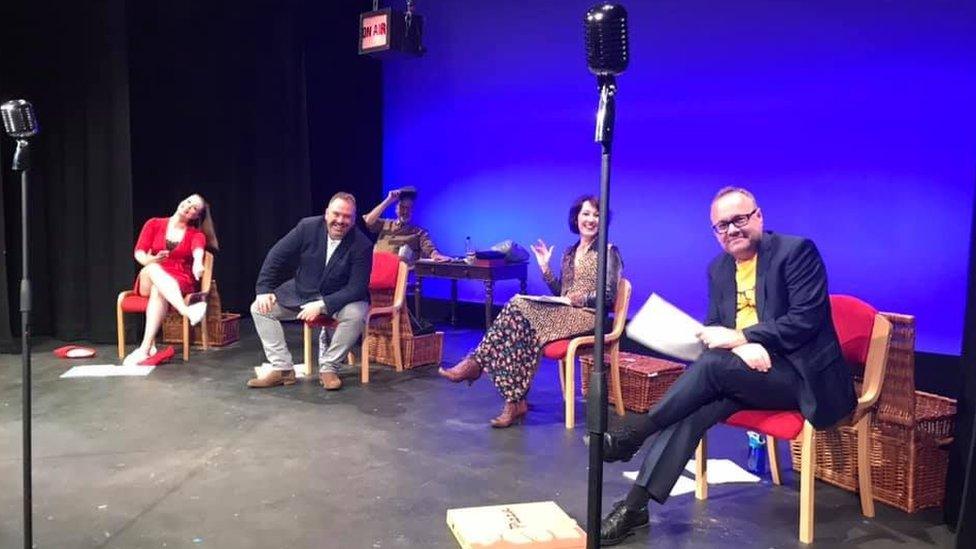
The Abbey Theatre's Company of Ten theatre group has been taking part in socially distanced rehearsals
Those who insist the show must go on have turned to technology.
In St Albans, the Abbey Theatre's Company of Ten group has live-streamed a sketch show, Radio Fun, and is selling tickets for online performances of Building the Wall.
Chairman Martin Goodman said the theatre had had to "adapt and change".
"It's been a revolution in how we deliver our product to different audiences - and that has been a wonderful thing. Whether it's commercially viable remains to be seen."
The theatre is planning socially distanced plays, with a potential audience of about 50, rather than its capacity of 240.
It is also looking at the idea of staging a youth production with "parallel casts" - having two sets of actors separately rehearse and perform a show to maximise the number of youngsters involved.
"The theatre is run by fanatics who are very focused on carrying on and contributing to our community, so we will find new ways of doing things," Mr Goodman insisted.
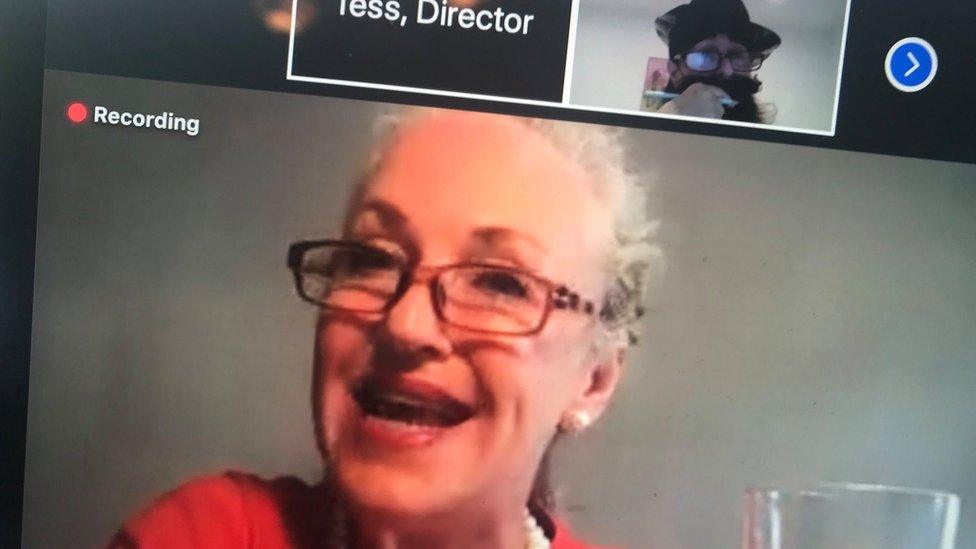
More than 50 groups have downloaded scripts of Zoom, A Play for Lockdown
Tess Townsend and Marie-José Zuurbier, from West Molesey in Surrey, used online rehearsals as the inspiration for a comedy play when their own group's production was halted.
More than 50 groups have downloaded their scripts of Zoom, A Play for Lockdown to perform using the ubiquitous video-conferencing platform.
"We've always clocked funny things people have done and said in amateur drama groups. Lockdown gave us oodles of time to start writing," Ms Townsend said.
"The saddest thing is that people are missing the communal feel of the am-dram experience - it's a great buzz and we're getting a bit of that feeling from our play."
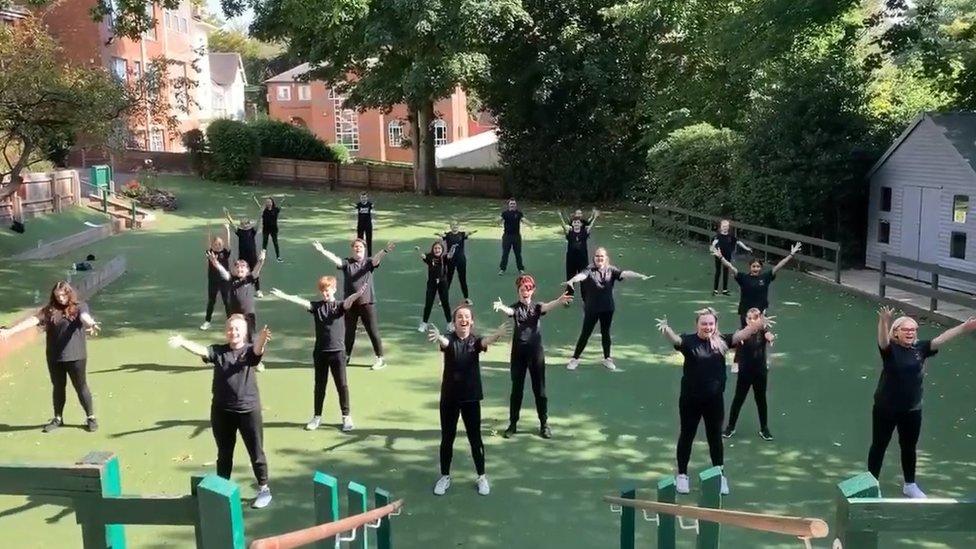
Members of Birmingham Youth Theatre have been rehearsing outside
Birmingham Youth Theatre chairman Linda Hamilton said her 30-strong cast of Shrek was "devastated" when their production was cancelled in April.
The company of nine to 19-year-olds is now hoping to perform it in December at the city's Crescent Theatre.
During the summer they managed socially distanced outdoor rehearsals at Cannon Hill Park as well as regular Zoom rehearsals and quizzes.
"They're a very close-knit family so it was important to maintain the contact," Ms Hamilton said.
"The lockdown has affected them - some are more anxious, but this gives them something different away from the other pressures in life."
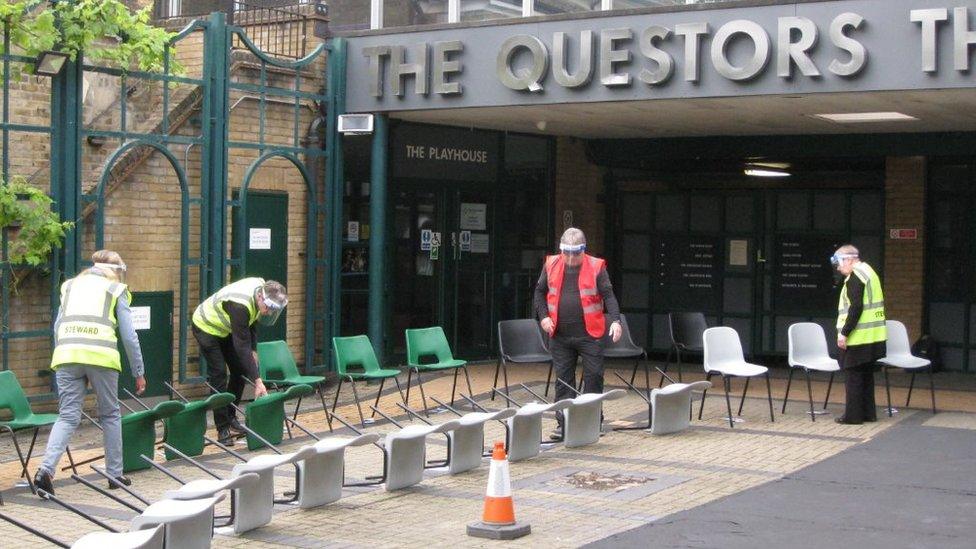
Special preparations were needed to make the Questors Theatre's outdoor performance Covid-safe
Staging a full show in the open air is one way to stay within social-distancing guidelines.
The Questors Theatre in Ealing, west London, took its chances with the British weather to stage The Bard in the Yard, a series of truncated Shakespeare extracts.
For the 30-strong audience it meant putting their names on a contact-tracing list, sanitising hands on entry and using socially distanced outdoor seating.
Artistic director Alex Marker said writers and performers needed to "take the constraints and limitations and turn them into an asset".
"If you set up the ground rules and framework of the world you are in at the outset of the play, the audience will suspend their disbelief and will embrace the event," he said.
It meant moments like the kiss in Romeo and Juliet being represented by the star-crossed lovers removing their face masks, touching them together - with no hand contact - and disposing of them as they exited.
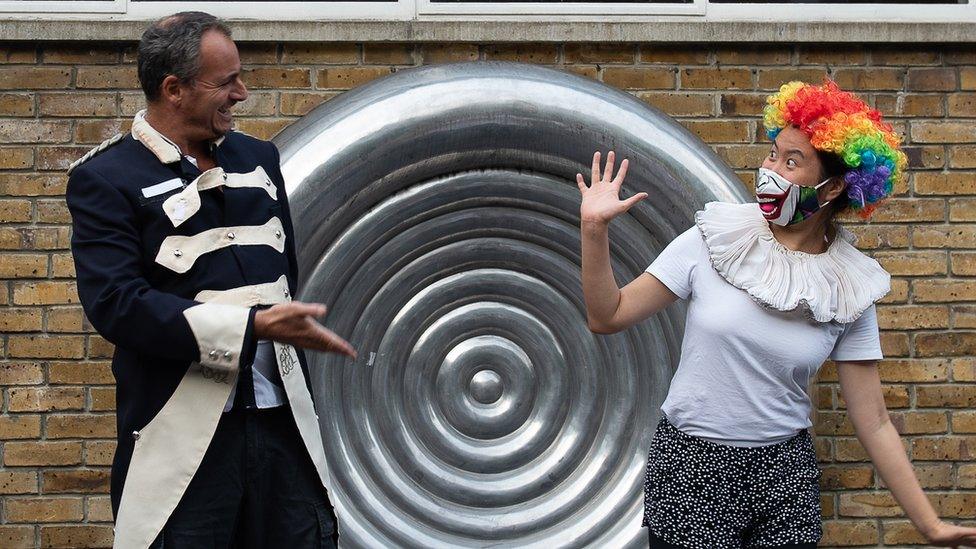
The Questors Theatre in Ealing staged The Bard in the Yard
Whether such productions can help amateur groups survive ultimately depends on how long social-distancing restrictions remain in place, according to the Little Theatre Guild which represents 115 groups which own or run theatre buildings.
Having volunteers rather than paid staff has kept costs down and many qualified for the government retail, hospitality and leisure grant of up to £10,000, said its chairman Mike Smith.
Nevertheless, he said the latest coronavirus restrictions had "knocked people's confidence".
"They may dissuade people from coming to watch theatre in confined spaces and there are doubts about whether actors are prepared to act," Mr Smith said.
"Many theatres have small stages, which makes putting on socially distanced shows very difficult.
"In the summer we were beginning to think that we could see ourselves reopening, but that's been put back - many of us won't get going until the new year at the earliest.
"The challenge is keeping people involved and interested.
"Theatre is so strong in Britain - we've got some great companies and we have to be careful not to lose them."
- Published8 September 2020
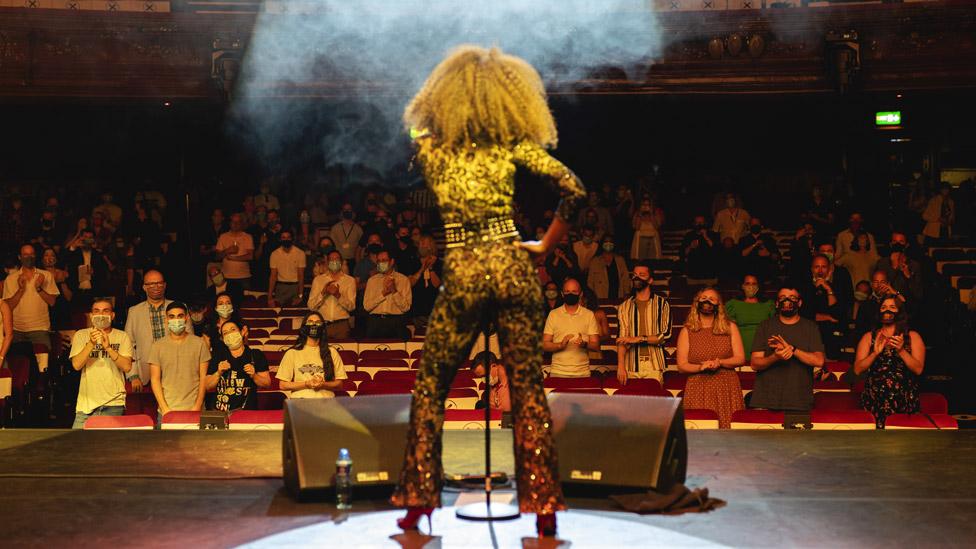
- Published17 July 2020
